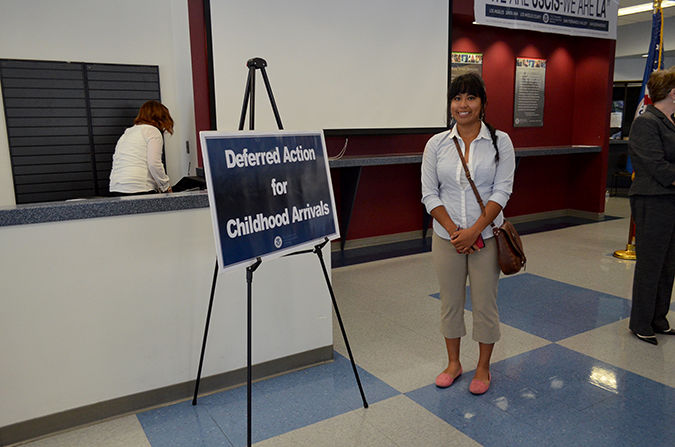Distrust, fear and lack of information discourage young undocumented immigrants from applying for temporary legal relief, according to a Homeland Security official.
Which is why Alejandro Mayorkas, deputy secretary of Homeland Security, last week called on Los Angeles immigration advocates, lawyers and beneficiaries to help.
The agency is preparing for the renewal process of the current Deferred Action for Childhood Arrivals (DACA) holders. Undocumented immigrants who arrived in the United States as children with their undocumented parents may be eligible for DACA.
“We are committed to this program,” Mayorkas told a standing-room-only meeting June 11 at the U.S. Citizenship and Immigration Services Los Angeles District Office downtown. “We want to partner with you to see who could be reachable and reach even those difficult to reach.”
The two-year duration of the document expires in August. The government agency is calling holders to seek renewal so they do not encounter a lapse in their work authorization.
About 600,000 young people who have pursued education or military services have applied to the DACA, but nearly 400,000 eligible youth still have not applied since the application process began nearly two years ago.
Advocates said the time frame (120 days) requested to submit the paperwork might be a hindrance.
“Getting a birth certificate in Mexico could take a lot of time,” an immigration advocate told Mayorkas at the meeting, and suggested a deadline extension. Mayorkas replied that the agency thinks it is necessary for people to start the application process on time and “not wait until 60 or 30 days before the time expires.”
Advocates and beneficiaries want DACA to be a permanent document, but Mayorkas said the agency would have to evaluate the progress of each individual.
“DACA doesn’t really provide a permanent relief. We are still not stable,” DACA beneficiary Edna Monroy told Mayorkas. She said it took her nine months to receive her document after applying within the time frame.
“We do not know what will happen four years from now, and in the meantime families are living in limbo,” she said.
Advocates also suggested offering additional methods to inform the public about the application process and reach those who are not aware of their eligibility.
Mayorkas said the agency will work closely with embassies, consulates and schools, as well as certain media outlets to offer information about the process requirements and legal services available.
Zacil Pech, a 24-year-old East Los Angeles Community College accounting major who arrived to the U.S. from Mexico when she was 4, said applying two years ago was a “fairly easy process.” Upon receiving her document she has been able to apply for government scholarships.
She encouraged youth who are still in the shadows and fearful to “not to be afraid of being detained or deported, and to come forward so that together we can fight for immigration reform.”
“This is why it’s important that government stops deportations,” she said. “That would make the DACA process easier.”
Immigration attorney Gloria Curiel thinks eventually the DACA will reach the status of the Temporary Protected Status (TPS), granted to certain groups of immigrants for humanitarian reasons.
“The fear factor shouldn’t even be considered,” Curiel told The Tidings. “If they have doubts or can’t afford it, please go see an immigration lawyer.”
Activists also asked if at some point the document could be e-filed, but Mayorkas said Homeland Security is in “no capacity” to cover those costs.
In the meantime, DACA holders will receive a reminder within 100 days before the document expires.
For more information, visit http://www.uscis.gov/humanitarian/consideration-deferred-action-childhood-arrivals-process/renew-your-daca.

